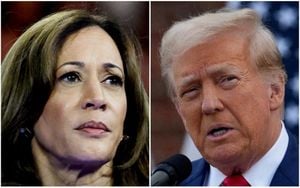On November 6, 2024, Germany was shaken by political uncertainty when Chancellor Olaf Scholz announced plans for a confidence vote scheduled for January 2025. This decision emerged shortly after the U.S. elections, leaving the future of Germany's coalition government hanging by a thread. With the coalition's popularity waning, many analysts predict this could lead to snap elections as early as February 2025, significantly earlier than the originally anticipated national elections planned for September of the same year.
The catalyst for this political upheaval can be traced back to the exposure of a contentious policy paper released by Finance Minister Christian Lindner from the Free Democrats (FDP). This document proposed economic strategies starkly at odds with the coalition's existing framework, especially concerning climate action and taxation policies. Titled "Economic Transition for Germany: Economic Concepts for Growth and Intergenerational Fairness," the paper sparked significant controversy by challenging core aspects of the coalition agreement with the Social Democrats (SPD) and the Greens. The rupture indicated by this disclosure led Chancellor Scholz to dismiss Lindner, leaving the SPD and Greens to steer as a minority government.
Germany's political situation is fraught with potential challenges, especially concerning its welfare state model, which has long been regarded as one of the pillars of its post-war economic stability. The country prides itself on this system, reflecting its commitment to social security and equality. Yet, Lindner's paper argues for reforms directed at reducing state intervention, which he claims is financially unsustainable, particularly as Germany's workforce ages and national debts grow.
According to Lindner, the rising costs associated with supporting this aging population represent what he describes as intergenerational injustice. Critics argue this perspective dismisses the importance of maintaining strong public services which, historically, have contributed to Germany’s economic prosperity. Implementing such severe shifts could yield detrimental effects on the country’s economic stability and social cohesion, creating heightened tensions both politically and socially, especially as the nation faces mounting pressures from its working-age populations.
Further compliculating matters, the tensions surrounding Germany’s climate policies are now under threat. A recent draft of the 2025 federal budget aimed at addressing climate issues could be severely impacted by Lindner’s push for reduced spending on environmental programs. His assertion prioritizing budgetary balance over climate action has raised alarms among environmental advocates. While he labels the existing Climate and Transformation Fund as "politically enforced decarbonization," critics argue this undermines Germany's existing commitments toward carbon neutrality by 2045.
The economic and environmental stakes could not be higher. Germany has long aimed to lead by example on the global stage, having committed to ambitious climate targets. The delay or dilution of climate initiatives, especially with looming elections, threatens not only the nation’s progress but also its credibility internationally as it positions itself as part of the climate change solution.
Failure to adhere to these climate commitments raises questions about the sustainability of Germany’s industrial transition and its resilience against global market shifts, particularly as the country’s agricultural sector struggles with the repercussions of increasing carbon pricing and rising living costs. Germany’s recent ranking among the lowest for food security within high-income countries only emphasizes the reality many citizens face, and this could fuel growing discontent with political leadership during election season.
Prominent voices within Germany’s business community have voiced strong opposition to Lindner's policy positions, labeling them as detrimental to both flourishing industries and the economy at large. Key industry leaders from major companies like BMW and Mercedes-Benz have all warned against the fostering of isolationist policies which would only hinder Germany’s global competitiveness and innovations.
The impending snap elections signal not just a potential shift within Germany’s domestic politics; they also echo through its international relations. Germany's longstanding partnerships, particularly within the EU, may face strain as new leaders emerge with varying visions for foreign policy and global cooperation.
Given this climate of uncertainty, what does the future hold for Germany as it steers toward possible snap elections? Will citizens favor the status quo or embrace new leadership advocating for radical economic changes? The outcome may well redefine Germany's role as both a leader within the EU and as a key player on the global stage.
Chancellor Scholz's upcoming confidence vote will undoubtedly be pivotal. It not only sets the backdrop for 2025’s political climate but raises questions of economic direction, social support structures, and climate policies placed on the political agenda. Germany stands at a unique crossroads; its decisions now will influence generations to come, potentially laying the groundwork for either future stability or unprecedented turmoil.



